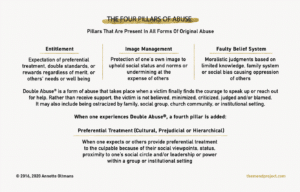One of the most common questions victims of domestic abuse ask is whether abusers can change their behavior or not.
In this article, we will explore this question in depth by discussing the psychological and emotional profile of an abuser, whether change is possible, and end with a final note about the support a survivor needs during this time.
Let’s get started.
The Possibility of Change in Abusers
The question of whether abusers can change their behavior is a complex and controversial one. We recognize that abusers are in desperate need of healing, but most don’t realize it or want it.
Some experts believe that abusers can change if they are motivated to do so. Others believe that once an abuser has engaged in abusive behavior, they are unlikely to change.
Statistically speaking, it is rare for an abuser to agree to undergo the extensive work required for them to transform their lives.

-
- However, we believe change is possible when an abuser is willing to do the work and receives expert abuse counsel.
Research has shown that abusers who participate in high-quality intervention programs are less likely to re-offend. These programs focus on addressing the root causes that contribute to abusive mindsets and behavior, such as low emotional IQ, entitlement, and patriarchy. The process of change for an abuser requires a commitment to high quality therapy, accountability group participation, and reading materials either required by the therapist or requested by the victim. The arduous process will likely take one to two years to see significant progress.
Keep reading to understand why it requires so much work.

Go deeper into the reasons the abuse is not your fault, here. In fact, read the page and memorize it! We don’t want you to sit in the seat of self-blame or low self-worth any longer!
Now, let’s look at some ways to accept that abuse is not your fault.
The Four Pillars that Make it Hard for Abusers to Change
Abusers often have complex psychological profiles that make it difficult for them to change their behavior. Since statistics consistently show that there are more male abusers than females we will approach this article from a male abuser and female victim context, however, this does not mean that men cannot be victims or women cannot be abusers.
At The MEND Project, we discuss the root causes of abuse by unpacking one of our popular tools, The Pillars of Abuse.
There are Three Pillars that represent the mindset of an abuser that drives their actions. The Fourth Pillar represents how many outsiders respond to abusers and victims in ways that embolden the abuser, interfere with proper interventions and further traumatize victims.

To Download a copy of The Four Pillars of Abuse click the image
The First Pillar: A Faulty Belief System
A Faulty Belief System and distorted thinking are part of an abuser’s emotional DNA and these characterological mindsets are deeply entrenched. Faulty belief systems may have developed in childhood, or later, from the abuser’s familial, social, political, or religious sources of influence.
A faulty belief system might include conscious or unconscious patriarchy, misogynistic beliefs, cultural biases, and religious attitudes that oppress women. It is nearly impossible for the victim to have a mutually respectful conversation, let alone a relationship, with someone whose beliefs motivate them to overpower their victim emotionally, physically, financially, or in other ways oppressing them.
The deep entrenchment in faulty thinking is hard to uncover and, once uncovered, is difficult for the abuser to recognize their beliefs as harmful or wrong.

The Second Pillar: Image Management
In Image Management, abusers are more often than not deeply invested in creating, maintaining, and protecting a positive public image in order to hide their true behavior patterns behind closed doors. Protecting one’s image also aids abusers to undermine their victims by grooming their audience to align with the abuser.
They are chronically defensive when the victim raises a reasonable complaint or concern and this is compounded by how protective they are about their public image. Abusers often blame the victim for their harmful outbursts or minimize what the victim experiences or values.
They criticize or block the victim and their perspectives when the victim attempts to share their views or concerns. While toxic behaviors are going on behind closed doors the abuser often works hard at presenting themselves as loving and caring partners to friends and family, portraying a very different image of themselves.

They are known to create what is known as a “Cloud of Confusion” by telling false or grandiose stories to third parties in order to objectively undermine the victim or to manipulate the end result or outcome when they fear being exposed. For example, they may volunteer at their local church so that their community will see them in a positive light.
This makes it difficult for those in that community to see the abuser accurately or to believe a victim’s story if she chooses to seek help. An abuser’s obsession with image management ultimately serves to elevate the abuser’s image while at the same time undermining the victim’s character and wrongly blaming her for the problems in the relationship.
Being mischaracterized by the abuser privately or in public is highly traumatizing for the victim. And the lack of intervention and/or improper intervention emboldens the abuser. Onlookers are unable to see the abuser’s toxic traits and therefore are unlikely to confront him causing him to believe he is invincible or not responsible for causing difficulties in the relationship.
The Third Pillar: Entitlement
A sense of Entitlement equates to the thought, mindset, and conviction where the abuser expects that he is inherently deserving of privileges and special treatment, regardless of merit, or the needs and well-being of others.
Abusers feel they deserve to be treated better than others in the family. Their internal mantra is, “I deserve to have what I want, when I want it, regardless of its impact on my partner.” This thinking leads them to exert control over their intimate partner without any sense of guilt or compassion for how double standards are oppressing them.
They believe they have a right to preferential treatment and that it is normal. For example, the abuser may believe that he holds a hierarchical position over the female spouse and that the rules he enforces against his partner don’t apply to him. We see this play out emotionally, financially, and in other ways where hierarchical beliefs place limitations on and oppress the victim.

A sense of entitlement can be conscious or unconscious. This characterological trait is difficult to unpack and confront. There are many nuances that play out in abusive relationships and no two relationships are alike. If the abuser is confronted by a counselor he often resists because his beliefs are deeply entrenched and he doesn’t want to give up the power and elevated standing he holds in the relationship.
The Fourth Pillar: Preferential Treatment
We call the fourth pillar Preferential Treatment which pertains to the double abuse a victim so often experiences. Special treatment and protections are given to abusers because of their status, proximity to one’s social circle, or position of leadership within an institutional setting.

Accommodations are often extended to an abuser when friends or associates reduce or remove responsibility and appropriate consequences for the harm he has caused, or not believing the accusations when they are brought to light. When others take the side of the abuser it is a highly traumatic experience for the victim.
When people in a social circle, religious or professional community come together in a form of groupthink to support an abuser the abuser is emboldened in their faulty thinking while the victim is powered-over and pushed further into oppression.
The victim’s trauma is exacerbated because they are both experiencing abuse are silenced while the abuser is exalted. When others come together and mirror to the abuser that they are worthy of support, rather than facing natural consequences for his destructive behaviors, it becomes more difficult for a therapist to break through the armor the abuser is relying on.
A shared trait of all who abuse is that they will say and do just about anything to avoid accountability and responsibility. The supportive group conveys to abusers that they do not deserve consequences which, in turn, interferes with proper interventions.
The Emotional Intelligence Connection
A person’s low emotional IQ contributes to chronic defensiveness and aggressive or passive-aggressive behavior. The abuser’s discomfort with emotions, his or hers, causes him to avoid or block authentic conversations. A low EQ can cause impulsive or emotionally or physically violent behavior, an inability to appreciate the victim’s perspective, and minimization of the victim’s feelings.
Ultimately, immature emotions block the victim from having authentic conversations where mutual respect and mutual validation occur. Low emotional IQ manifests by anxiousness, impulsivity, and defensiveness.
Abusers can be highly intelligent, accomplished, and charismatic while having an underdeveloped emotional IQ. They ‘react’ rather than self-regulate, self-examine, or implement self-control to ‘respond’ rationally and empathically.
Emotional immaturity can make change for an abuser impossible if they aren’t willing to cooperate with therapeutic interventions.
The Patterns of Complexity
The Pillars of Abuse along with a low emotional IQ contribute to the abuser’s attitudes, beliefs, and behaviors within interpersonal relationships. Outsiders may never see these signs of abuse in the abuser when they are in public. This confuses and wrongly influences outsiders’ assumptions regarding the abuser’s character, which makes it difficult for them to believe the victim when she shares her circumstances with them.

Supporting Victims of Abuse
Supporting victims of abuse is essential in helping them recover from the trauma they’ve experienced.
The impact of abuse on victims can be devastating and far-reaching. Victims may experience physical injuries, emotional trauma, and financial instability. They may also suffer from anxiety, depression, post-traumatic stress disorder (PTSD), and physiological symptoms associated with PTSD. In some cases, victims may lose their job, home, and sadly, even their children due to how debilitating trauma can be.
The impact of abuse on children can also be severe and long-lasting, both for children who experience abuse directly from their primary caregiver and for children who witness abuse in their home. Children who witness emotional or physical abuse are more likely to develop mental health and physiological problems. They are prone to engage in abusive behavior or adopt a victim mentality themselves in order to avoid becoming abusive.
The greatest help you can provide a victim of abuse is to allow the victim to share their story and to process their experiences in a caring and safe environment without judgment. They need to be listened to, believed, and validated. They may also need practical support, such as help with finding housing or legal assistance or connecting them to other resources.
Even when an abuser decides to do the hard work to change, the one who has been harmed by enduring trauma decides whether they can and want to reconcile the relationship, or whether they need to leave. The time and work to change takes a lengthy process where there will be many setbacks and successes. Each setback adds trauma to the victim, therefore she must be the one given the authority to decide her next steps.
As we stated at the beginning of the blog, the question of whether abusers can change is a complex and controversial topic. If you are looking for further insight or have questions about the subject, The MEND Project offered a free workshop which we have recorded and you can find on our website or youtube channel. Here’s a link: Can Abusers Truly Change?.








Was the following recorded to watch later??
The MEND Project is offering a free training intensive on July 18th at 10 AM PST. Join Founder Annette Oltmans as she provides some insight and deep perspective on one of the most common questions victims and survivors ask: Can Abusers Change? Seats are limited. Click here to register today
I am so sorry. We failed to update the link within the blog to refer people to the recording. I will do so right now, but in the meantime, you can find all recordings on our YouTube channel including this one: https://www.youtube.com/watch?v=Nrx_dXx3WUQ&t=1s. Hope you enjoy!